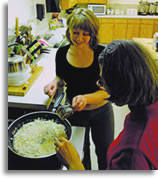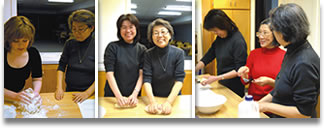by Laura Wonderlin
Each Wednesday they gather. The smells of food waft in, welcoming new members with a sense of comfort and camaraderie. They stand in an oblong kitchen, the décor reminiscent of the 1970s. The walls are white; the cabinets have a light maple stain. The women cluster in small groups around a large island that is slightly off center. The meat on the stove sizzles.
From outward appearances, it looks like any church gathering. The women wear ribbed sweaters in spite of the heat emanating from the kitchen. They push their sleeves above their elbows in an effort to cool down. Their hair is neat, and many have it pulled back with barrettes.
On Wednesdays, between 10 and 15 women gather to cook in the basement of St. Paul’s Lutheran Chapel and University Center in Iowa City, Iowa. These women are wives of international Ph.D. students at the University of Iowa. Their ages range from mid-30s to early 50s. They are Korean, Chinese, Taiwanese, and Russian. They are Christian, Buddhist, and atheist. Some arrived in Iowa City only a few months ago; some have been here for two years. They are unable to work because of green-card restrictions. Food provides them a link to friendship in a new community, as evidenced by the chatter that fills an otherwise quiet church.
 |
|
During a St. Paul’s cooking class, Magen Lin (left) and Deaconess Angie Carriker make gravy.Photo: Laura Wonderlin |
One woman begins to speak and the room falls silent. Deaconess Angie Carriker talks in a commanding voice. With a smile that can be understood in any language, she asks how everyone’s week was. She speaks slowly, deliberately, making sure her message gets across.
Carriker, a 2009 graduate of the deaconess program at Concordia Seminary, St. Louis, runs the Inter-national Student Ministry for St. Paul’s. The program began four years ago and has grown steadily since. Weekly, about 40 women attend a variety of classes. According to Carriker, options such as writing, conversation, and Bible study offer these women a chance, not only to build relationships, but also, if they are non-Christian, to learn about the Christian faith. The cooking class is one of the most popular.
In the past, the group has made stuffed bell peppers, bananas foster, and French bread. On this Wednesday, they make spaghetti and meatballs. They read the recipe aloud, slowly sounding out each ingredient, asking what “thyme” and “rosemary” are.
Many of these women have never had spaghetti or made meatballs before. They watch Carriker demonstrate how to make a meatball, and each replicates it with ease before dropping the rounded clumps into a skillet.
Another Wednesday, they make a Korean dish named beef bulgogi. This is a new part of the program. Not only are American dishes being prepared, but now each woman takes a turn and teaches the group about a dish from her home country.
Clearly, food unites. Without much direction, each woman grabs an ingredient, and washes, chops, or slices it. The rice cooks, the meat marinates, and the kiwi and pears are blended for the sauce. As they practice their culinary skills, they converse. English is the medium.
Not only is Carriker’s class a way to learn about food, it is a way to practice English and meet others who are in the same situation.
Eunhee is from South Korea and has been in Iowa City since August. She learned about St. Paul’s program through a friend.
Eunhee likes Iowa City. She likes that there are more parks and trees than in South Korea, and fewer buildings and less pollution. She does not like the food.
Eunhee has attended two other cooking classes. She has learned to make apple pie and chili. But with a knowing smile, she admits she would not make them for her family. She likes Korean food better.
It is Olga’s first class. She is from Moscow and has been in Iowa City for a year. She is timid at first, perhaps because the rest of the women know each other and many converse in their native tongue. Her English isn’t as well developed as the others, but that doesn’t stop the group from taking her into the fold. To describe oyster sauce they draw a picture and use their hands, mimicking the opening and closing of the shell.
Olga smiles. She is now part of this group.
A few Wednesdays later, the weather turns colder, and Christmas approaches. This week, the class will be making Christmas cookies. On the island sits the usual holiday cookie cutters: a Christmas tree, a bell, a star.
The women, per usual, take turns reading out the list of ingredients, andbecome stumped when it comes to “molasses.”
What is it? Won’t a whole jar be too sweet? Is this honey?
The jar of molasses is passed around, and everyone takes a turn smelling and tasting it.
As they mix the ingredients for the gingerbread cookies, they talk of Christmas traditions back home.
 |
Left to right: Deaconess Angie Carriker and Dalyai Sohn prepare dough; Carol Chen and Dalyai Sohn; Carol Chen, Megan Lin, and Dalyai Sohn. |
Carol Chen, from Taiwan, says Christmas is for the kids. She doesn’t celebrate the holiday, but the kids do. The teens go to pubs, parties, and the movies. The little ones want presents.
As the cookies are put into the oven, the group talks about what they did for Thanksgiving. The heat of the kitchen now has a pleasant feeling. It smells of cookies baking.
The snickerdoodles have 10 minutes left, so the group tackles the gingerbread. Carriker flours the counter, but it doesn’t stop the dough from sticking to any surface it comes in contact with. The gingerbread men are glued to the counter and are freed only after being manhandled by a spatula. Many of the gingerbread men are missing limbs, the stars look more like starfish, and the trees are misshapen. They still taste good.
With the gingerbread cookies in the oven, the women clean up. It is organized. They each clean the dishes or wipe off a counter.
As these women sit around a table together, it is apparent that this is a thriving community.
They have found a place they can gather together.
Together, their English improves. Together, they joke with each other. Together, they learn about a new country.
Carriker loves her job. She sees each woman’s confidence improve. In the beginning, many are shy and unsure of their English. But through attendance of these classes, they open up. Slowly, they begin asking deeper questions or telling stories about their lives.
The classes offered at St. Paul’s provide a medium to build relationships, not only with one another, but with God, Carriker explains. She feels her job is to be a support system. Through the relationships Carriker has built with each woman, she is able to share the Gospel. If the women miss their home countries or feel stressed, Carriker is able to say, not only are their friends and family there for them, but God is right there, too.
Before the women delve into the meal before them, they bow their heads for prayer.
Come, Lord Jesus,
Be our guest,
And let these gifts to us be blessed.
Amen.
—
About the Author: Laura Wonderlin is a journalism student at the University of Iowa.





